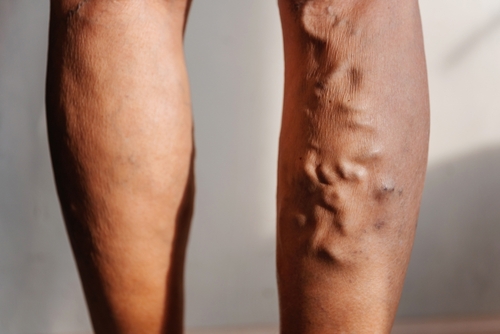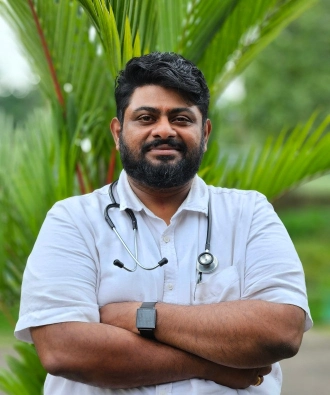Hello, I’m Surej, a consultant physician at the Ayur Bethaniya Hospital in Thrissur. Over the years, I’ve had many patients walk into my consultation room with a common concern about the painful, swollen veins in their legs. Often, they’re embarrassed or confused, and one of the first questions they ask is, “Are varicose veins hereditary?” This question opens the door to a deeper conversation not just about genetics, but also about lifestyle, body constitution (prakriti) and how Ayurveda offers a natural, sustained approach to healing.
As a practicing Ayurvedic physician at Ayur Bethaniya in Kerala, I have treated numerous cases of varicose veins using holistic methods that bring not only physical relief but also a long-term restoration of balance within the body. In this blog, I’d like to share my experience and Ayurvedic understanding of this increasingly common vascular issue.
Understanding Varicose Veins
Varicose veins are swollen, twisted, and often bluish or purplish veins that commonly appear on the legs and feet. They occur when the valves in the veins that control blood flow become weak or damaged, leading to blood pooling and vein enlargement.
Common symptoms include
- Feeling tiredness or pressure on the legs
- A sensation of pain that is either burning, throbbing, or cramping
- Swelling in your lower legs and ankles
- Visible, bulging veins
Symptoms tend to become worse after long hours of sitting or standing.
Are Varicose Veins Hereditary?
Let me address this based on both modern understanding and Ayurvedic wisdom.
From a modern medical perspective, yes, varicose veins can be hereditary. If those close to you have genetic disorders, you may be at a higher risk of developing them as well. Most of this happens because the vein walls or valves are not as strong as they should be.
In Ayurveda, we understand this hereditary tendency as a doshic imbalance, particularly of Vata dosha, within the body. When Vata is aggravated, it disrupts the smooth flow of blood and bodily fluids. This can lead to poor circulation, dryness, and weakening of tissues, conditions that create varicose veins to develop. So while genetics might set the stage, it’s our daily lifestyle, diet, and internal balance that determine how the condition manifests. Genetics can increase your risk for varicose veins, but, however, hereditary factors don’t guarantee varicose veins.
My Experience with Varicose Veins
In my experience, patients who have varicose veins often live inactive lives, always feel overworked, get very stressed, or have difficult daily eating habits. Their risk is higher when they are postpartum or if they have hormonal changes. Focusing on lifestyle changes and Ayurvedic therapies helps us help patients feel better, improves their overall health, and lowers the need for more serious treatments like surgery.
Ayurveda for Varicose Vein Management
So, how do we approach Ayurveda for varicose vein care? The root issue we typically identify is an imbalance in Vata and Rakta (blood). Treatment is then tailored to balance the doshas, improve blood circulation, strengthen vein walls, and rejuvenate body tissues.
Here are the core principles of Ayurvedic management we follow at Ayur Bethaniya:
1. Herbal Remedies
Ayurveda has several herbs that help strengthen your veins, decrease, and improve blood flow.
- Ashwagandha is useful for decreasing stress, improving blood flow, and enhancing the health of our nervous system.
- Gotu Kola (Mandukaparni) is known for its valuable benefits of strengthening and rejuvenating the veins.
- Punarnava is an anti-inflammatory herb that can ease inflammation and also lower the risk of fluid retention.
2. Abhyanga (Medicated Oil Massage)
When you do a full-body massage with Sahacharadi or Kottamchukkadi Thailam, it can help enhance blood circulation and lessen any stiffness or pain in your legs. Regular abhyanga also helps pacify Vata dosha, which plays a crucial role in this condition.
3. Basti (Medicated Enema)
Vata originates in the colon, and Basti therapy is the best known remedy for Vata disorders. Enemas made with herbal oils or decoctions can substantially relieve symptoms and restore systemic balance.
4. Dietary Recommendations
The food you eat is extremely important. We recommend warm, cooked, easily digestible foods that help balance Vata. Some key tips:
- Include ghee, sesame oil, and warm spices like ginger and cumin.
- Avoid consuming foods that are dry, cold or processed.
- Drink warm drinks and herbal teas to keep the body hydrated and improve circulation.
5. Yoga and Lifestyle Adjustments
Gentle yoga poses like Viparita Karani (legs-up-the-wall) and Tadasana (mountain pose) can help ease pressure in the legs and support venous return. We guide our patients to avoid standing or sitting for long periods and encourage periodic movement throughout the day.
Prevention Through Ayurvedic Wisdom
While the question “Are varicose veins hereditary” is important, what’s more empowering is knowing that Ayurveda gives us tools to prevent and manage the condition effectively, even if we carry a genetic predisposition.
- Maintain a Vata-pacifying diet and routine.
- Engage in regular physical activity and stretching.
- Manage stress with meditation and breathing exercises.
- Seek early intervention at the first signs of heaviness, pain, or visible vein changes.
A Word from My Practice
At Ayur Bethaniya, we focus not just on treating symptoms but on restoring balance to the entire system. Our approach to Ayurveda for varicose vein treatment is personalized, taking into account the individual's prakriti (constitution), doshic imbalance, lifestyle, and history.
Many of our patients come to us feeling hopeless after trying temporary solutions. Through Panchakarma therapies, herbal formulations and mindful living, we’ve seen consistent improvement in their condition without invasive procedures.
Final Thoughts
Varicose veins may have a hereditary component, but they are not an unchangeable fate. With the right Ayurvedic guidance, nourishing habits and timely intervention, you can not only manage the symptoms but also support your veins for the long term. If you or someone you love is dealing with varicose veins, don’t ignore the early signs. Connect with an experienced Ayurvedic practitioner and consider a holistic, sustainable path to healing.
For comprehensive Ayurvedic care, feel free to visit us at Ayur Bethaniya Ayurveda Hospital in Thrissur. We’re here to support your journey toward wellness with care and compassion.
Feel free to contact us for your queries.
Read to know: How Ayurveda Helps In Postnatal Care

